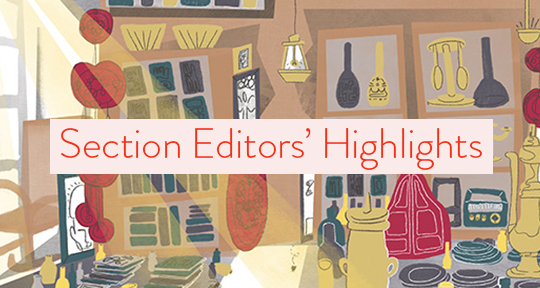As testament both to our times and to Asymptote’s ongoing commitment to accentuating the richness and value of global literature, our Summer 2020 issue is replete with texts that vary in their gifts but are unified in their resonance. To help you navigate this selection, our section editors are here with their top picks.
From Lee Yew Leong, Fiction Editor and “Vignettes” Special Feature Editor:
Less diverse than a typical Asymptote lineup, I’m nevertheless proud of the five pieces I curated for the regular Fiction section: Each one wrestles with despair—even if it’s a different timber of dread than the one we’re currently in. In Italian author Christian Raimo’s “No More Cult of the Dead for Twentieth-Century Italy,” two men, haunted by dreams of dead bodies, set out to find and bury one. It’s an exhilarating tale of redemption set against the backdrop of a financial crisis—rendered in Brian Robert Moore’s tonally perfect translation. Don’t miss Czech novelist Daniela Hodrová’s Puppets (Living Pictures); cotranslators Elena Sokol and Véronique Firkusny took home a 2020 PEN Translates Award for their masterful work. In the hypnotic excerpt that we were lucky to present, the reader is whisked across time via a jump-rope. Featuring translations from the Arabic, Chinese, Macedonian, Portuguese, Russian, and Telugu, our more diverse wildcard Special Feature shines a spotlight on the humble vignette. From conventional shorts to metafictional haikus, there’s truly something for everyone. My favorite is perhaps Marianna Geide’s People and Other Beings. Via translator (and past contributor) Fiona Bell, Geide conjures up bizarre creatures—insects shaped like bird droppings, predators shaped like human ears, uselessly decorative bugs, mushroom people—and examines each of her specimens with the precision of a jeweler.
From Garrett Phelps, Poetry Editor:
“Dead Sea” by Yang Lian feels about as close as a piece of writing can get to its subject. Even more impressive is that he does this in two hundred and seventy words, and that the subject is a country gripped by a modern plague. It’s a vision of hell illustrated with “a dense tessellation of images, often hard for the translator to disentangle, which build and build to powerfully symphonic effect,” in the words of translator Brian Holton. Despite the obscurity, however, it’s oddly tangible and even familiar at times, probably because this same hell has become global.
dead fishies drift with the tide with no high hopes of escaping underwater
there is no underwater in your world
From Sam Carter, Criticism Editor:
In a review of Dmitri Prigov‘s Soviet Texts, Dan Shurley makes the Russian conceptualist writer’s work come alive by grounding an analysis of his work in broader trends both inside and outside the former Soviet Union. Prigov was, as Shurley explains, “a shape-shifter and a master of appropriating the lofty rhetoric of Soviet authority in whatever form it took,” and Shurley carefully guides us through the many offerings and intricacies of the collection that was published by Ugly Duckling Presse and translated by Simon Schuchat with Ainsley Morse.
Another collection, this time of work from multiple writers, is discussed in Ysabelle Cheung‘s review of That We May Live, which contains seven stories of Chinese speculative fiction that delve into alternate realities not entirely separate from our own. Cheung walks us through examinations of particular concerns that, taken together, allow this anthology to “reference global philosophical quandaries and anxieties.” READ MORE…




